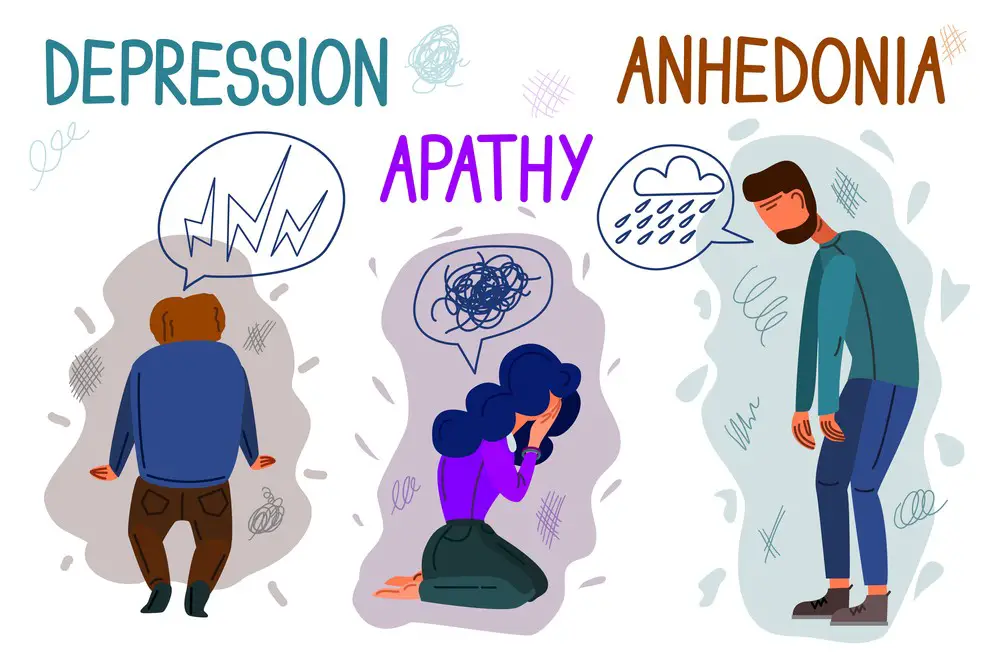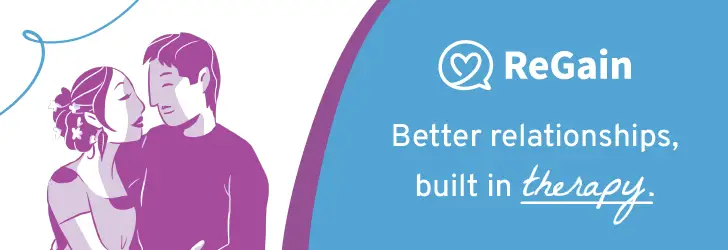As a BetterHelp affiliate, we receive compensation from BetterHelp if you purchase products or services through the links provided
Cheating on a partner is a devastating and complicated event that can lead to many emotions, including depression. Betraying someone’s trust can leave the cheated individual with overwhelming guilt, shame, and regret. It’s essential to examine these emotions and understand the connection between infidelity and the subsequent feelings of depression that often follow.
When someone cheats, they often experience a deep sense of remorse and distress over their actions. This can be further amplified by the repercussions on the relationship, which may include loss of trust, emotional turmoil, and even separation. Navigating through this storm of emotions is challenging, and it’s crucial for the individual who cheated to seek appropriate coping mechanisms and professional help, if necessary.
Key Takeaways
- Cheating can lead to intense guilt, shame, and regret, resulting in depression.
- Understanding emotions and seeking coping mechanisms are crucial for the individual who cheated.
- Professional help can guide healing and address potential infidelity-related mental health issues.
 Understanding the Emotion After Infidelity
Understanding the Emotion After Infidelity
Infidelity, often called cheating, is a significant act of betrayal that can have a deep and lasting emotional impact on both the person who cheated and the person who was cheated on. Understanding the feelings that may arise following infidelity is essential to navigate the healing process effectively.
After an act of infidelity is discovered, the person cheated on may experience a range of emotions, including hurt, anger, confusion, and sadness. They may feel a deep sense of betrayal and loss of trust, often questioning the entirety of their relationship. This emotional turmoil can have long-lasting effects on their future relationships and self-esteem.
On the other hand, the person who cheated may also experience an array of emotions. They may feel guilt, shame, and regret for their actions. The knowledge that they have hurt someone they care about can lead to feelings of depression and anxiety. In some cases, these emotions may be compounded by the potential breakdown of their relationship and the loss of their partner’s trust.
In dealing with the emotional aftermath of infidelity, both parties must recognize and validate their feelings. This can be done through open communication, seeking the support of friends or family, or engaging in professional therapy. Processing the emotions surrounding infidelity is essential in moving forward, whether the relationship continues or ends.
It is important to note that while feelings after infidelity can be intense, they may change over time as individuals process and come to terms with the situation. Some may find that their emotions lessen in intensity over time, and they can begin to heal and rebuild trust. However, this process is unique to each individual and may take time and continuous effort.
In summary, the emotional impact of cheating and betrayal on both parties involved is significant and complex. Understanding and validating these feelings is essential to navigate the healing process effectively, whether that involves the continuation or ending of the relationship.
 Depression as a Consequence of Cheating
Depression as a Consequence of Cheating
Cheating on a partner can result in many negative emotions and consequences, including depression. An individual who cheats may grapple with sadness, guilt, and remorse, which can contribute to developing depressive symptoms.
The impact of cheating on mental health cannot be understated. As feelings of sadness and guilt intensify, it can lead to a decline in self-esteem and an increase in negative thoughts. These feelings might manifest as worthlessness, despair, or even hopelessness. As the individual continues to process their actions, the emotional turmoil may become overwhelming, culminating in a full-blown depression.
It is crucial for those experiencing depression after cheating to recognize the signs of this mental health condition. Identifying the warning signals can help determine if professional help is necessary. Some common signs of depression include:
- Persistent feelings of sadness or emptiness
- Loss of interest or pleasure in most activities
- Changes in appetite or weight
- Sleep disturbances, including insomnia or oversleeping
- Fatigue or loss of energy
- Difficulty concentrating or making decisions
- Feelings of worthlessness or excessive guilt
- Recurrent thoughts of death or suicide
Understanding the connection between cheating and depression is vital for anyone who has engaged in infidelity. Recognizing the potential emotional fallout can shed light on the importance of addressing and confronting the issues that have arisen and taking steps to heal any broken bonds or relationships that have been affected. Seeking professional help from therapists or support groups can aid the recovery process, ensuring those struggling with this emotional burden do not have to face the challenge alone.
 Guilt, Shame, and Regret
Guilt, Shame, and Regret
Individuals who experience depression after cheating on a significant other often feel guilt, shame, and regret. These emotions can weigh heavily on their mental well-being, making it challenging to move forward and heal from the situation.
Guilt typically arises after cheating, as the person recognizes the hurt they have caused their partner. This feeling is rooted in understanding the impact of their actions, and it may manifest as self-reproach and remorse. Individuals experiencing guilt may also need to make amends and repair the damage they have inflicted.
Shame, on the other hand, stems from a deeply internalized sense of being unworthy or flawed. When someone feels shame after cheating, it is often due to their perception that they have tainted their identity and values. This can lead to a negative self-image, perpetuating depressive thoughts and behaviors.
Regret is acknowledging one’s mistakes and the desire to act differently. In the context of cheating, regret often involves replaying the events that led to the betrayal, analyzing decision-making, and wishing they had chosen a different path. This emotional turmoil can contribute to depression as individuals struggle to accept their past actions and reconcile them with their current state of mind.
Coping with guilt, shame, and regret requires understanding and self-compassion. Recognizing human behavior’s complexities and the factors contributing to cheating can be a crucial first step in addressing these emotions. Furthermore, seeking professional help, such as therapy, can assist individuals in processing these feelings, exploring personal values, and paving the way for healing and growth.

Coping Mechanisms for the Cheater
It’s common for individuals who have cheated on their partners to experience depression, anxiety, and stress. Taking appropriate steps to cope with these emotions is essential for their mental well-being. Implementing self-care and self-reflection practices can significantly improve the situation.
One of the essential coping mechanisms is self-care. The cheater must ensure they are taking care of their physical and emotional needs to manage their depressive symptoms effectively. This includes eating well, exercising, getting enough sleep, and engaging in relaxing activities. Additionally, seeking professional help from a therapist or counselor is advisable to address unresolved guilt and ensure a healthy recovery process.
Another beneficial coping strategy is self-reflection. Cheaters need to confront the reasons behind their actions. Understanding what drove them to cheat can help them learn from their mistakes and improve personal growth. One way to facilitate self-reflection is through journaling. Writing about thoughts and feelings can provide valuable insights and help individuals process their emotions.
Healthy communication with loved ones is also essential for coping with depression after cheating. Opening up to friends or family members about their experiences and emotions can provide a much-needed support system. This connection can help alleviate anxiety and stress, allowing individuals to heal and move forward.
Practicing mindfulness techniques such as meditation and deep breathing exercises can help manage the stress and anxiety that often accompany feelings of guilt. Mindfulness promotes self-awareness and can teach individuals to be present in the moment, fostering healthier emotional responses and decision-making.
In conclusion, finding appropriate coping mechanisms is vital for individuals dealing with depression after cheating. By practicing self-care, self-reflection, seeking professional help, and embracing a support system, individuals can address their emotional well-being and work towards healing.
 Repercussions on the Relationship
Repercussions on the Relationship
Depression after cheating can have lasting effects on a relationship. The betrayed partner experiences many emotions, including shock, anger, and grief. Trust built throughout the years can suddenly vanish, resulting in relationship issues that may be difficult to overcome.
When trust is broken, rebuilding it can seem like an insurmountable task. Both parties must be willing to communicate openly, embrace honesty, and commit to healing the damaged relationship. This process, however, can be painstakingly slow and require tremendous effort.
Relationship Issues: Cheating often results in relationship issues that might seem irreversible. Some common problems include jealousy, inadequacy, or even a desire for retaliation. For a relationship to have a chance at recovery, both partners must acknowledge these issues and work together to resolve them.
Open Communication: A key component in rebuilding trust is open communication. Sharing thoughts, emotions, and concerns is essential, as this can create a safe space for the healing process. Active listening also reinforces the idea that both parties are committed to overcoming the challenges together.
Honesty: Being honest with one another is crucial in repairing broken trust. This means admitting mistakes, sharing true feelings, and sincerely trying to avoid future instances of infidelity. Honesty can also help the betrayed partner understand the circumstances that led to the cheating, which might provide some closure.
Although dealing with the repercussions of cheating is challenging, relationships can recover. By addressing relationship issues, promoting open communication, and practicing honesty, couples might be able to rebuild trust and move toward a more stable and fulfilling relationship.

The Healing Process
Dealing with depression after cheating on someone can be challenging and complex. It is essential to acknowledge the feelings of guilt, shame, and regret that may accompany this experience. The healing process involves several key steps to help individuals overcome these emotions and move toward personal growth.
Firstly, therapy is often a valuable resource for individuals facing depression. A professional therapist can help explore one’s emotions, thoughts, and actions related to infidelity. They can also guide in identifying underlying issues that may have contributed to the situation. Therapy is a safe space for individuals to express their feelings and begin to understand themselves better.
The healing process also involves forgiveness, which is crucial for both the person who committed the infidelity and the one who was hurt. Forgiving oneself for the mistake can help alleviate feelings of guilt and shame. At the same time, seeking forgiveness from the hurt partner is essential to help repair trust and heal the relationship (if both parties are willing). It is important to remember that forgiveness is a process that may take time.
An essential aspect of the healing process is working on personal growth. This entails understanding the reasons behind the cheating and learning from the experience. Identifying patterns of behavior that may have led to the infidelity can provide insights into personal growth and self-improvement. This process may involve setting personal goals, recognizing areas for growth, and actively working towards becoming a better individual.
Making amends with the affected party is another critical step in the healing process. This might involve accepting responsibility for one’s actions, offering a sincere apology, and taking steps to rebuild trust. Open and honest communication is essential during this time, as it allows both partners to express their feelings and work together toward mutual understanding.
Lastly, moving on from the infidelity and the resulting depression is vital to the healing process. Each person’s journey to moving on will be unique, as it depends on their circumstances and the severity of the situation. However, progress and acceptance are key components of moving on. This may involve accepting the changes in the relationship, whether it survived the infidelity or ended, and moving forward with one’s life.
In conclusion, the healing process after cheating on someone and experiencing depression involves therapy, forgiveness, personal growth, making amends, and moving on. Each step is crucial in helping individuals navigate their emotions and learn from their actions, ultimately leading to a more self-aware and emotionally resilient future.
 Getting Professional Help
Getting Professional Help
When an individual is facing depression after cheating on someone, seeking professional help is an essential step in the healing process. A qualified counselor can provide guidance and support, allowing them to understand their emotions better and work towards self-improvement and emotional stability.
Counseling sessions can offer beneficial therapeutic techniques to manage depression and cope with guilt, shame, and regret. Treatment plans in counseling are personalized and tailored to address an individual’s unique needs and concerns. Some common forms of treatment for depression related to cheating may include cognitive-behavioral therapy, interpersonal therapy, and supportive counseling.
Individuals need to choose a counselor specializing in relational issues and depression to ensure optimal progress in recovery. Look for a licensed mental health professional with experience and training in dealing with infidelity and its emotional aftermath. Some reputable sources for finding a qualified counselor include referrals from friends, family, or healthcare providers.
Aside from individual counseling, participating in support groups may also prove useful for those seeking help and understanding from others in similar situations. Group therapy provides a safe and non-judgmental environment to share experiences, emotions, and insights, fostering empathy and emotional growth.
In conclusion, taking the initiative to seek professional help is crucial for individuals dealing with depression after cheating on someone. Counseling, group therapy, and a skilled mental health professional’s guidance can pave a path toward healing and self-forgiveness.
Substance Abuse and Depression
Substance abuse, including drug and alcohol abuse, can be common among individuals who experience depression after cheating on someone. The feelings of guilt, regret, and emotional pain can lead to increased consumption of substances as a coping mechanism.
Drug and alcohol abuse can further exacerbate depressive symptoms, creating a harmful cycle of addiction and depression. An individual struggling with these emotions might use substances to numb the emotional pain, but this temporary relief can lead to long-term addiction. Additionally, substance abuse can negatively impact relationships, careers, and overall well-being, contributing to further depression.
It is important for individuals dealing with depression due to cheating to recognize the signs of substance abuse and addiction, such as increased tolerance, withdrawal symptoms, and neglected responsibilities. Seeking professional help is essential to address both depression and substance abuse simultaneously. Approaches such as therapy, support groups, and medication can be beneficial in overcoming these challenges.
Preventing substance abuse is also crucial in these instances. An individual might focus on healthy coping mechanisms, such as engaging in physical exercise, practicing mindfulness, or seeking support from friends and family to navigate the turmoil after cheating.
In conclusion, substance abuse and depression are intertwined concerns that require attention and care. Acknowledging the issue, seeking help, and adopting healthier coping mechanisms are vital steps toward healing and recovery.
Mental Health Issues Related to Cheating
Cheating in a relationship can lead to various mental health issues for the person who cheated and the one who was cheated on. The act of betrayal disrupts the bond’s trust and stability and causes immense emotional turmoil. This section explores some of the most common mental health issues associated with cheating.
One of the primary mental health issues that may arise following an act of infidelity is depression. The person who cheated may experience feelings of guilt, remorse, and worthlessness, leading to a sense of hopelessness and sadness. On the other hand, the cheated individual may suffer from low self-esteem, a sense of betrayal, and a loss of faith in relationships, all of which can contribute to depression.
Additionally, both parties may experience anxiety as a result of the infidelity. The person who cheated may constantly worry about their actions’ repercussions and fear their partner will discover the truth. Conversely, the individual who was cheated on may struggle with trust issues and be constantly on edge, expecting their partner to cheat again.
Post-traumatic stress is another mental health issue that may surface in the wake of cheating. The betrayal can be so emotionally devastating that the person cheated on may relive the moment of discovering the infidelity, experiencing intrusive thoughts, nightmares, and flashbacks. This can result in emotional numbing, avoidance, and an increased sense of vigilance.
Furthermore, the fallout from cheating can increase susceptibility to other mental health issues, such as substance abuse, eating disorders, and self-harm. Either party might employ these maladaptive coping mechanisms to escape or alleviate the emotional pain and distress caused by the infidelity.
While cheating can cause significant harm to an individual’s mental health, it is crucial to remember that healing and recovery are possible. Seeking professional help, working on healthy coping strategies, and engaging in open and honest conversations with a support network can aid in overcoming the negative impact of infidelity on one’s mental well-being.
Future Outlook and Responsibility
In the aftermath of cheating, one should focus on the future and accept responsibility for their actions. It is crucial for the individual who cheated to understand the consequences and address the emotional pain caused by their actions.
Taking responsibility for one’s actions means understanding why the cheating occurred and learning from it. This self-awareness can lead to personal growth as individuals can identify problem areas within themselves and work towards improving them. They can demonstrate genuine remorse and a willingness to change by taking these steps.
A future-oriented mindset involves setting goals and establishing a path to rebuild trust and repair relationships. This may include couples therapy or additional resources such as books, online forums, and support groups. Individuals can move forward and work towards a healthier future by focusing on personal growth and development.
Accepting responsibility also means maintaining open and honest communication with the affected partner. Transparency, empathy, and understanding are key elements in the healing process, as they allow both parties to express their emotions and concerns. Fostering trust and creating an open dialogue will ultimately contribute to the eventual rebuilding of the relationship or provide closure.
In conclusion, focusing on the future and accepting responsibility for cheating is critical for personal growth and relationship recovery. By addressing the underlying issues contributing to the infidelity and committing to change, individuals can work towards a brighter, more honest future.
Frequently Asked Questions
Is it normal to feel depressed after betrayal?
Yes, feeling depressed after being betrayed, such as experiencing infidelity, is a normal reaction. The trust and emotional bond that was once integral to the relationship is broken, leading to sadness, anger, and disappointment. It’s important to recognize and process these feelings to move forward and heal.
Can infidelity cause depression?
Infidelity can contribute to the development of depression in some individuals. Betrayal in a relationship can lead to a crisis of self-esteem, feelings of worthlessness, and emotional pain. These factors may increase the risk of depression. However, not everyone who experiences infidelity will become depressed.
What is the usual duration of depression after cheating?
The duration of depression after infidelity varies from person to person. Some factors that may influence the length of depression include the individual’s resilience, the severity of the betrayal, and the support system in place. With proper help and self-care, most people will eventually be able to cope with the feelings and emotional consequences of cheating.
How does being cheated on affect mental health?
Being cheated on can negatively impact an individual’s mental health. Along with depression, a person may experience increased anxiety, stress, and feelings of isolation. The sudden loss of trust and the crumbling of an emotional foundation can lead to mental health challenges that may require support and professional help to overcome.
What are the emotional consequences of cheating?
The emotional consequences of cheating are wide-ranging and can include anger, sadness, and disappointment. The person cheated on may question their self-worth and struggle with trust in future relationships. Additionally, the cheated person may feel guilt, regret, and fear of losing their partner, leading to additional emotional turmoil.
How can one cope with depression after infidelity?
There are several ways to cope with depression after infidelity, such as seeking professional help through counseling or therapy, finding support from friends and family, and practicing self-care. Maintaining open communication with the affected partner can help rebuild trust and heal emotional wounds. It is essential to be patient with oneself and to allow time for emotions to settle and clarity to emerge.
- Breaking the Silence: Why Men’s Mental Health Matters More Than Ever - April 15, 2025
- How to Transform a Home’s Patio Space into a Relaxing Space - March 23, 2025
- 5 Strategies to Use a Cell Phone to Help Manage Your Stress - March 23, 2025
This site contains affiliate links to products. We will receive a commission for purchases made through these links.


 Understanding the Emotion After Infidelity
Understanding the Emotion After Infidelity Depression as a Consequence of Cheating
Depression as a Consequence of Cheating Guilt, Shame, and Regret
Guilt, Shame, and Regret
 Repercussions on the Relationship
Repercussions on the Relationship Getting Professional Help
Getting Professional Help

